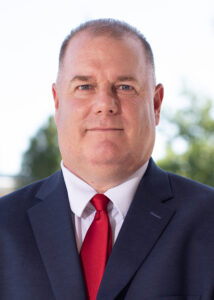
Judge of Character: Eric Tamashasky Works to Improve Justice System
Written by Doug Goodnough
Eric Tamashasky, ’96, admits he originally went into law school to get rich. However, the former prosecuting attorney and current magistrate judge for the St. Joseph County Superior Court in Indiana has found his legal career in law enforcement and the justice system far more enriching than his original plan.
He has been doing innovative and groundbreaking work in the emerging field of cybercrime and the law and is working as a force for good in helping shape future lawyers as an adjunct instructor at the University of Notre Dame—all while serving as a magistrate judge during the day.
Although he decided in kindergarten that he wanted to be a lawyer, the path that he took to get his law degree was anything but direct.
In fact, after he graduated from Hillsdale College with his degree in economics, he enrolled in law school at the University of Cincinnati. That lasted one day. He dropped out and decided to play piano in a bar while he figured out what he wanted to do.
“This doesn’t feel right,” he said of his initial entrance into law school. “I’m going to see if it’s possible to do this in a different order. And my parents very much encouraged me and said, ‘Hey, make sure you are ready to do this now. And if that path says you need to take a timeout, do it. We will always support you—and law isn’t something you need to rush into.’”
The Cincinnati, Ohio, native eventually decided to return to school, but it was at The Ohio State University to study economics. He earned his master’s degree in 1998 and returned back into the business world. After three more years, law school’s calling finally resonated and he decided to return to law school—this time at Notre Dame—and aspired to become a big firm lawyer.
After spending the summer following his first year of law school working with renowned Notre Dame Law School Professor G. Robert Blakey, who wrote the Racketeer Influenced and Corrupt Organization (RICO) Act and also served on the Warren Commission, Tamashasky realized his calling was criminal justice.
“I always had a love of true crime books growing up. My mom and I watched the O.J. (Simpson) trial from afar and talked on the phone every day during that,” he said. “Even so, I never once imagined that I would be a prosecutor. But after working with Professor Blakey, I realized that’s what I wanted to do.”
After completing his law degree in 2004, he was hired as a deputy prosecuting attorney for the St. Joseph County (Indiana) Prosecutor’s Office. He helped introduce technology into the state’s trial presentations and was able to work on murder cases less than three years out of law school. All the while, he continued to learn how the justice system operated.
“The best part about being a prosecutor was everybody else who looks at the news will look at something and say, ‘Somebody should do something about that,’” Tamashasky said. “As a prosecutor, I had the opportunity to be the person who did. It’s an amazing feeling to work with law enforcement to try and do justice in situations where really horrible things have happened to innocent people.”
In 2006, part of his role expanded to include the high-tech crime unit, which involved a new but emerging area of concern for law enforcement. He assisted police investigators as a prosecutor on cases like online child exploitation and threats, as well as digital and cell phone forensics.
In 2011, he was named a legal advisor and cybercrimes investigator for the St. Joseph County Police Department. As an investigator in these areas, he worked to build the cases and then present the investigations to local prosecutors. He received training on the technological side of these cases, including even spending a couple of weeks with the Secret Service learning about cell phone forensics. Working in his role as a “cyber detective,” he realized there were some serious shortcomings in the area of writing search warrants for electronic and cyber cases.
As technology rapidly advanced, he said most police agencies struggled to keep pace with the evolving requirements of warrants in the digital space. And even with access to forensic capabilities, backlogs were often many months before someone could analyze digital evidence even if a constitutionally proper warrant existed.
Enter Notre Dame undergraduate students. Tamashasky said longtime friend and colleague Mitch Kajzer, along with St. Joseph County Prosecutor Ken Cotter, instituted a groundbreaking program that allows Notre Dame law students to execute search warrants involving digital evidence in criminal cases for local police agencies. Tamashasky, who was teaching his “Cybercrimes and the Law” course at Notre Dame at the time, incorporated his students into the effort along with students from Kajzer’s multiple class offerings.
Kajzer is now the managing director of the Cybercrimes Investigations, Research, and Education Initiative (CIRE) on the Notre Dame campus. CIRE partners with the St. Joseph County Cyber Crimes Unit in helping with digital forensics on criminal cases. Under the program, students are deputized and are sworn in as prosecutor investigators, badges and all.
“Part of it is teaching students the ins and outs of the digital Fourth Amendment,” Tamashasky said. “Literally when a murder happens in the city, it involves all (cell) phones ending up on a student’s desk the next day. Those students-turned-investigators are held to the standards of professional law enforcement officers. Ensuring they’re equipped with the necessary tools to guarantee their actions are appropriate is of paramount importance.”
Students then review submitted warrants—rejecting some if better scope or direction is needed as well based on their knowledge obtained from Tamashasky. The students process the digital evidence, and even prepare additional warrants, which are reviewed by judicial officers in St. Joseph County, which now include Tamashasky himself.
The initiative has been so successful, the State of Indiana has used Notre Dame’s program—and a similar one at Purdue University—as models for a state-wide effort to improve access to information in criminal cases. The state legislature recently approved funding for 10 units around the state that pair local universities with law enforcement to try to address the digital forensic backlog and help the criminal justice system access—with proper warrants—information relevant to both defendants and law enforcement in cases.
During his time as a prosecutor, Tamashasky said he used his position to help balance the scales of justice in an unconventional way. He participated in a program that helped expunge the records of criminals who were trying to better themselves and needed some assistance from the system they were once caught in.
“You have somebody who as a younger person got in trouble in the legal system, and ended up with a criminal history,” he said of the pro bono program. “They’ve worked incredibly hard to change their direction and their trajectory, but have always had this Scarlet Letter following them. It seems crazy that people who did something when they were 20 still have to be accountable for it at 40 or 45. It just seemed wildly unfair.”
The elected prosecutor of St. Joseph County, Ken Cotter, and Magistrate Andre Gammage decided in the middle of the COVID-19 pandemic to try something new—the prosecutor’s office including in its conception of justice the element of forgiveness inherent in the expungement concept.
The program was expecting an initial turnout of 25-30 people, but it ended up having more than 500 show up at a local South Bend church the first night.
“We had an incredible turnout,” Tamashasky said. “It changed a lot of lives.”
After a lengthy career as a prosecutor, police officer, and professor, he had an opportunity to serve in another role in the justice system. After a friend who was a judge was elevated to another position, he encouraged Tamashasky to apply for the open magistrate judge position he was leaving behind. Tamashasky got the appointment in October of 2021, and after a transition period of learning how to do the job, he said he has found his calling.
“I’m now starting to feel more comfortable with it,” said Tamashasky, who handles a docket of cases covering both civil and criminal cases. “Every day is something new, so there’s never a dull moment on either the criminal side or the civil side of my docket. This is probably the first point in my professional career where I feel like what I’m doing may well be my final stop. It is a humbling experience to be able to serve in the judicial capacity. Lots of people have hopes for what the court system should be, and I have the ability each day to do my best to make that hope a reality. My biggest role is ensuring each side is heard and understood; I think the most successful judges realize that procedural fairness is the hallmark of a just court. People truly do care more about believing in the process than even whether they win or lose. That the judge listened—that makes all the difference.”
He said Hillsdale was instrumental in both his law career and how he tries to impact the criminal justice system. In fact, a constitutional law class he took at Hillsdale left such a lasting impression that he modeled his own course for Notre Dame students after it.
“It gave me the opportunity to sort of hone what my approach to law school would be, in the safer environment of an undergrad class with undergrad expectations versus law school expectations,” he said. “By the time I finally started my first day of law school at Notre Dame, I was very comfortable with what my approach to learning law daily was going to be because I learned how to do it well at Hillsdale.
“My time at Hillsdale was fabulous,” he continued. “The friendships I made there last to this day. I had a chance to learn a lot both in and out of the classroom. And to do that at a place like Hillsdale, where you can explore new ideas in a space where different ideas are welcome, set me up for a lifetime of opportunity. When you go out into the world with a Hillsdale education, you know how to learn and how to teach yourself new things. That ability, nurtured during my time on campus, provides me the belief that while every day I find new things I didn’t know, with patience and effort I can continue to learn how to better serve in whatever way I’m called to serve my community.”

Doug Goodnough, ’90, is Hillsdale’s director of Alumni Marketing. He enjoys connecting with fellow alumni in new and wonderful ways.
Published in February 2024